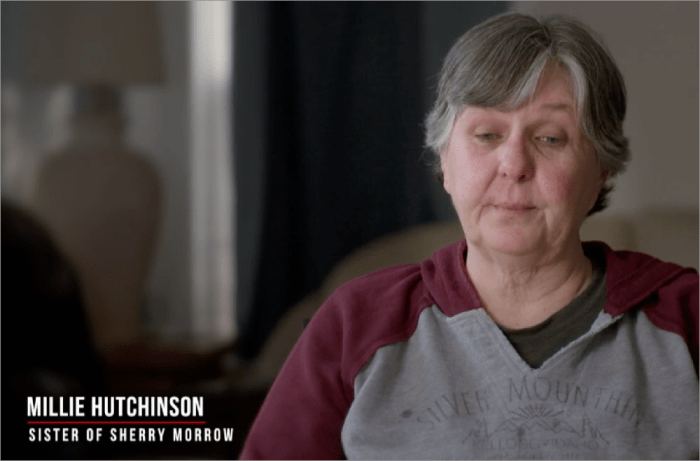Sherry is in her mid eighties – Sherry is in her mid-eighties, and her journey through life has been marked by both triumphs and challenges. As she navigates this stage of her life, she shares her experiences and insights, offering a unique perspective on aging and the human spirit.
Sherry’s story is one of resilience, determination, and a deep appreciation for the simple things in life. She has faced numerous obstacles, but she has never given up on her dreams. Her story is an inspiration to all of us, reminding us that it is never too late to live life to the fullest.
Demographic Profile
Individuals in their mid-eighties constitute a unique demographic group with distinct characteristics and experiences. This age group is characterized by both challenges and opportunities, reflecting their accumulated life experiences and the realities of aging.
Life Expectancy
Life expectancy for individuals in their mid-eighties has steadily increased over the past few decades. According to the Centers for Disease Control and Prevention (CDC), the average life expectancy for an 85-year-old American is approximately 87 years for women and 84 years for men.
Sherry is in her mid-eighties, and she’s still as sharp as a tack. Her memory is impeccable, and she can recall events from her childhood with amazing clarity. She’s also a bit of a word nerd, and she loves to learn new words.
Recently, she’s been studying words with the prefix hypo . She’s found that these words are often used to describe things that are below normal or deficient in some way. For example, the word “hypothermia” refers to a condition in which the body temperature drops below normal.
Sherry finds these words fascinating, and she’s always eager to learn more about them.
Health Statistics
Health statistics for individuals in their mid-eighties vary widely, depending on individual factors such as genetics, lifestyle, and access to healthcare. Common health conditions include:
- Cardiovascular disease
- Cancer
- Arthritis
- Dementia
- Hearing and vision impairments
Lifestyle Factors
Lifestyle factors play a significant role in the well-being of individuals in their mid-eighties. Regular exercise, a healthy diet, and social engagement can contribute to improved physical and mental health outcomes.
Unique Challenges
Individuals in their mid-eighties face several unique challenges, including:
- Increased risk of chronic health conditions
- Reduced mobility and physical function
- Financial concerns
- Social isolation
- Cognitive decline
Opportunities
Despite the challenges, individuals in their mid-eighties also have opportunities for personal growth and fulfillment. These include:
- Spending time with family and friends
- Pursuing hobbies and interests
- Volunteering or giving back to the community
- Learning new skills or taking classes
- Reflecting on their lives and experiences
Physical Health Considerations

Individuals in their mid-eighties face unique physical health challenges. Understanding these concerns and exploring preventive measures and treatment options is crucial for maintaining optimal well-being.
Common health concerns include mobility issues, chronic diseases, and sensory impairments. Mobility issues, such as difficulty walking or climbing stairs, can affect independence and quality of life. Chronic diseases, like heart disease, stroke, and arthritis, are prevalent and require ongoing management.
Mobility Issues
- Causes: Age-related muscle loss, joint degeneration, neurological disorders
- Preventive measures: Regular exercise, maintaining a healthy weight, assistive devices
- Treatment options: Physical therapy, occupational therapy, medication
Chronic Diseases
- Common types: Heart disease, stroke, diabetes, arthritis
- Risk factors: Age, family history, lifestyle choices
- Preventive measures: Healthy diet, exercise, regular check-ups
- Treatment options: Medication, lifestyle modifications, surgery
Sensory Impairments
- Types: Vision loss, hearing loss, balance problems
- Causes: Age-related changes, disease, genetics
- Preventive measures: Regular eye and ear exams, balance exercises
- Treatment options: Corrective lenses, hearing aids, assistive devices
Cognitive Function and Mental Health

As individuals progress through their mid-eighties, they may experience changes in their cognitive function and mental health. These changes can range from mild to more severe and can impact memory, attention span, and problem-solving abilities.
Maintaining Cognitive Function
- Engage in regular mental activities: Reading, writing, playing games, and participating in social activities can help stimulate the mind and maintain cognitive function.
- Exercise regularly: Physical activity has been shown to improve blood flow to the brain, which can benefit cognitive health.
- Get enough sleep: Sleep is essential for memory consolidation and overall brain health.
- Manage stress: Chronic stress can have a negative impact on cognitive function. Find healthy ways to manage stress, such as exercise, yoga, or meditation.
- Eat a healthy diet: A diet rich in fruits, vegetables, and whole grains can provide the nutrients that the brain needs for optimal function.
Promoting Mental Well-being
- Stay socially active: Social interaction can provide emotional support, reduce loneliness, and improve mental well-being.
- Find purpose and meaning: Having a sense of purpose and meaning in life can contribute to mental well-being.
- Seek professional help when needed: If you are experiencing significant changes in your cognitive function or mental health, it is important to seek professional help from a doctor or mental health professional.
Social and Emotional Aspects
Individuals in their mid-eighties often experience significant social and emotional changes. Retirement, a common transition at this age, can lead to a loss of structure and purpose. Additionally, changes in relationships, such as the loss of a spouse or friends, can be emotionally challenging.
Coping with Loss
Coping with loss is a significant emotional challenge for individuals in their mid-eighties. Grief and bereavement can be intense and long-lasting, particularly after the loss of a spouse or close companion. It is important to allow oneself time to grieve and seek support from family, friends, or a therapist if needed.
Fostering Social Engagement
Maintaining social engagement is crucial for emotional well-being in mid-eighties. Participation in community activities, volunteer work, or social groups can provide opportunities for socialization and a sense of purpose. Additionally, staying connected with family and friends through regular visits, phone calls, or video chats can help reduce feelings of isolation.
Emotional Resilience
Emotional resilience is the ability to adapt to and recover from challenging life events. Individuals in their mid-eighties can foster emotional resilience by engaging in activities that bring them joy and fulfillment, practicing mindfulness and meditation, and seeking support from loved ones or a therapist when needed.
Financial and Legal Considerations: Sherry Is In Her Mid Eighties

As individuals reach their mid-eighties, they may encounter various financial and legal matters that require careful planning and attention. These include managing retirement income, ensuring proper estate planning, and establishing healthcare directives to protect their interests.
Retirement Income
Individuals in their mid-eighties are likely to be fully or partially retired. It is crucial to have a stable source of income during this phase of life. Retirement income may come from various sources, such as Social Security benefits, pensions, investments, and savings.
It is essential to plan ahead and estimate expenses to ensure financial security throughout retirement.
Housing and Living Arrangements

As individuals reach their mid-eighties, their housing and living arrangements often need to be reevaluated to ensure their well-being and safety. Several options are available, each with its advantages and disadvantages.
Independent Living
Independent living refers to individuals living in their own homes or apartments without requiring regular assistance with daily tasks. This option offers the highest level of autonomy and privacy but may become challenging if individuals experience mobility or cognitive decline.
- Advantages:
- Highest level of independence
- Familiar environment
- Lower cost compared to other options
- Disadvantages:
- Lack of assistance with daily tasks
- Safety concerns, especially if mobility is impaired
- Loneliness and isolation
Assisted Living
Assisted living facilities provide a supportive environment for individuals who need assistance with daily tasks but still maintain a degree of independence. These facilities offer meals, housekeeping, laundry, and personal care services, as well as social and recreational activities.
- Advantages:
- Assistance with daily tasks
- Social and recreational activities
- Peace of mind for family members
- Disadvantages:
- Higher cost compared to independent living
- Less privacy and autonomy
- May not be suitable for individuals with advanced cognitive decline
Nursing Home Care
Nursing homes provide 24-hour medical care and supervision for individuals who are unable to live independently or in assisted living facilities. They offer a range of services, including medical treatment, skilled nursing care, rehabilitation, and end-of-life care.
- Advantages:
- Highest level of medical care
- 24-hour supervision
- Social and recreational activities
- Disadvantages:
- Highest cost of all options
- Least privacy and autonomy
- May feel institutionalized
Healthcare Needs and Access
Individuals in their mid-eighties face unique healthcare challenges due to age-related changes and chronic conditions. Understanding their needs and providing appropriate care is crucial for maintaining their well-being.
Chronic disease management is a primary concern. Conditions such as heart disease, diabetes, and arthritis are prevalent among this population and require ongoing care and monitoring. Preventive care is also essential to identify and address potential health risks, such as falls, cognitive decline, and infections.
Challenges in Healthcare Provision
- Multimorbidity:Co-existing chronic conditions increase complexity of care and medication management.
- Functional limitations:Mobility and dexterity issues can hinder access to healthcare services and self-care.
- Cognitive decline:Memory and attention problems can affect medication adherence and understanding of health information.
- Financial constraints:Out-of-pocket expenses and limited insurance coverage can limit access to essential care.
Opportunities for Improved Care, Sherry is in her mid eighties
- Integrated care models:Coordinating care across multiple providers and settings to ensure seamless transitions and comprehensive management.
- Telehealth and home-based care:Expanding access to healthcare services for individuals with limited mobility.
- Caregiver support:Providing resources and training to family members and caregivers who play a vital role in supporting daily needs.
- Advance care planning:Encouraging discussions about end-of-life preferences and ensuring healthcare decisions align with individuals’ values.
Caregiving and Support Systems
Family, friends, and professional caregivers play crucial roles in supporting individuals in their mid-eighties. Family members often provide emotional support, companionship, and assistance with daily tasks. Friends can offer social engagement, transportation, and respite care. Professional caregivers, such as home health aides, provide skilled nursing care, medication management, and personal care.
Challenges and Rewards of Caregiving
Caregiving can be both challenging and rewarding. Challenges include the physical and emotional demands of providing care, the potential for caregiver burnout, and the financial burden of caregiving. Rewards include the satisfaction of making a difference in someone’s life, the opportunity to strengthen family bonds, and the personal growth that can come from facing challenges.
Strategies for Building Effective Support Systems
Building effective support systems involves identifying and accessing resources, coordinating care, and providing emotional support to caregivers. Resources include community organizations, support groups, and respite care services. Coordination of care involves working with healthcare providers, social workers, and other professionals to ensure a comprehensive care plan.
Emotional support for caregivers can come from family, friends, therapists, or support groups.
Advocacy and Empowerment

As individuals enter their mid-eighties, advocacy and empowerment become crucial for ensuring their voices are heard and their rights are respected. By providing support and resources, we can empower older adults to make informed decisions and actively participate in their care and well-being.
Importance of Advocacy
- Ensuring Rights are Respected:Advocacy helps protect the rights of older adults, including their right to dignity, autonomy, and access to quality care.
- Addressing Discrimination and Ageism:Advocacy challenges ageism and discrimination that can limit older adults’ opportunities and access to resources.
- Promoting Inclusion and Participation:Advocacy works to create inclusive environments where older adults are valued and their perspectives are considered.
Empowering Older Adults
Empowering older adults involves providing them with the knowledge, skills, and support they need to make informed decisions about their care and well-being.
- Providing Information and Education:Access to accurate information about health, care options, and legal matters empowers older adults to make informed choices.
- Encouraging Self-Advocacy:Supporting older adults in developing their self-advocacy skills enables them to communicate their needs and preferences effectively.
- Facilitating Decision-Making:Involving older adults in decision-making processes related to their care and living arrangements fosters their sense of control and well-being.
Successful Aging in Mid-Eighties

Navigating the mid-eighties presents unique challenges, but successful aging is possible. Individuals who maintain a high quality of life in this age group often exhibit resilience, adaptability, and a positive outlook.
Factors contributing to successful aging include maintaining physical and cognitive health, engaging in meaningful activities, cultivating strong social connections, and accessing necessary healthcare and support services.
Strategies for Promoting Well-being
- Prioritize regular exercise, a balanced diet, and adequate sleep.
- Engage in mentally stimulating activities such as reading, puzzles, or learning new skills.
- Foster meaningful relationships with family, friends, and community members.
- Seek professional help when needed for physical or mental health concerns.
- Explore opportunities for volunteering, hobbies, or part-time work to stay active and engaged.
Question & Answer Hub
What are some of the challenges that people in their mid-eighties face?
People in their mid-eighties may face challenges such as declining health, mobility issues, and cognitive impairment. They may also experience social isolation and loneliness as they lose friends and family members.
What are some of the opportunities that people in their mid-eighties have?
People in their mid-eighties have the opportunity to enjoy their retirement, spend time with loved ones, and pursue new hobbies and interests. They can also volunteer their time to help others and make a difference in their community.